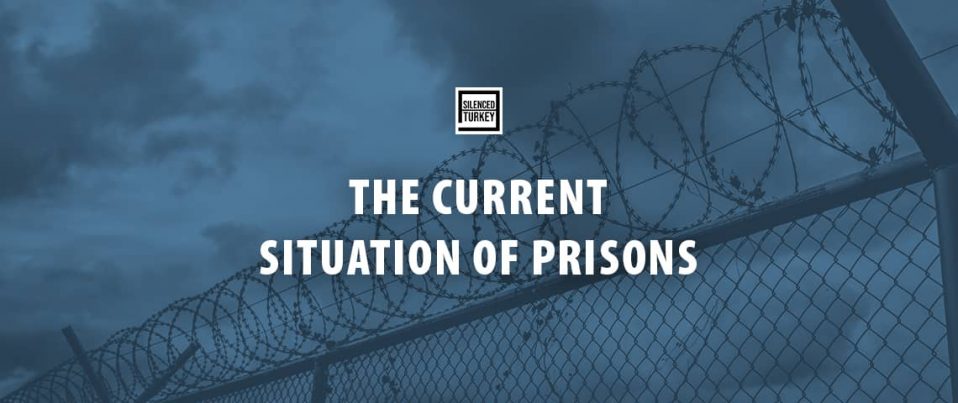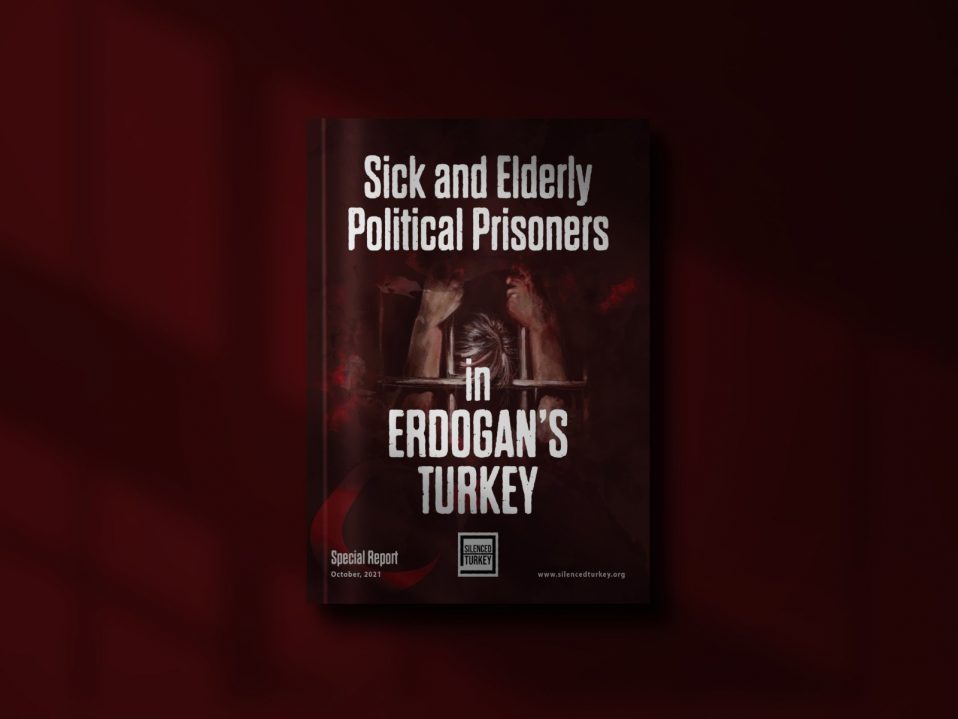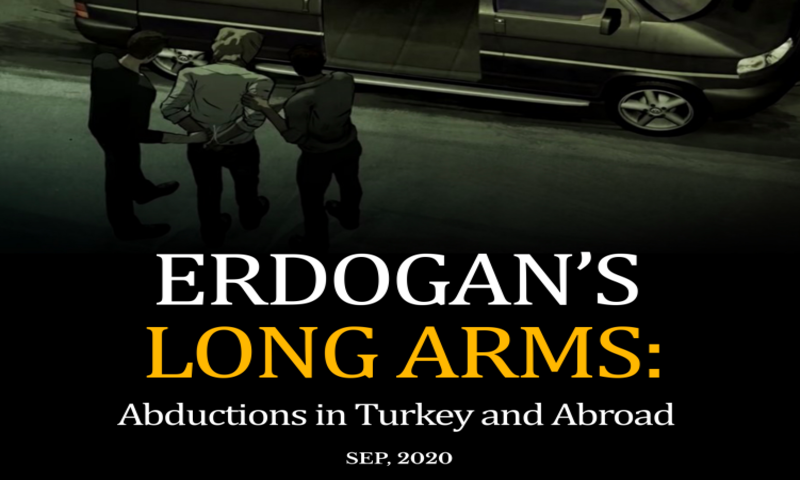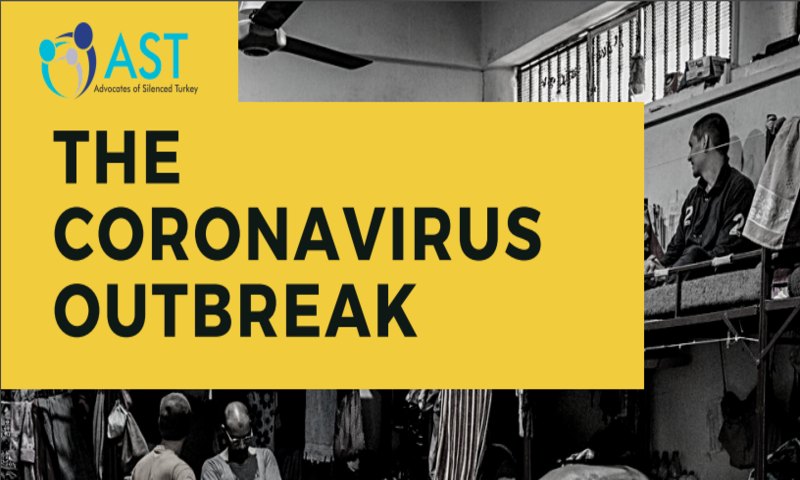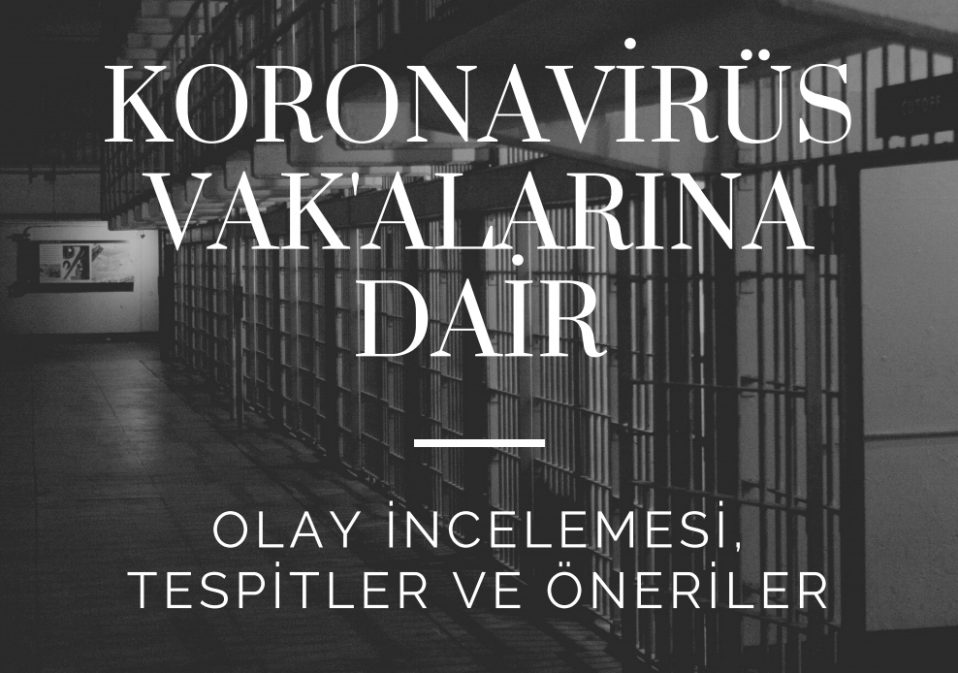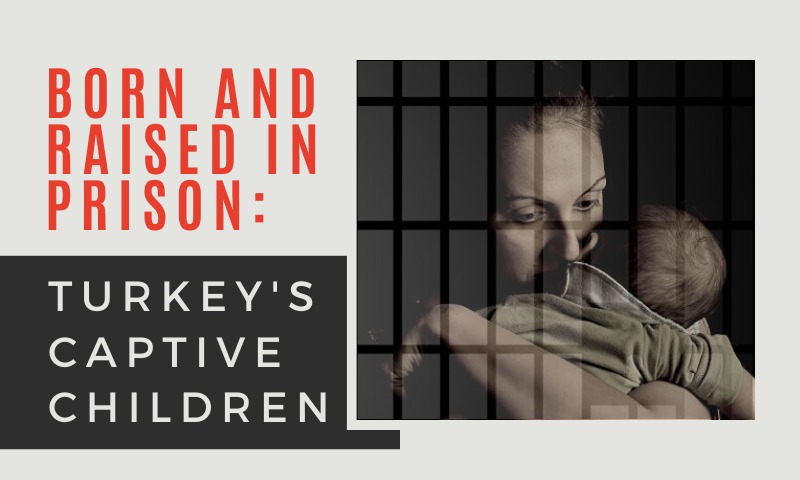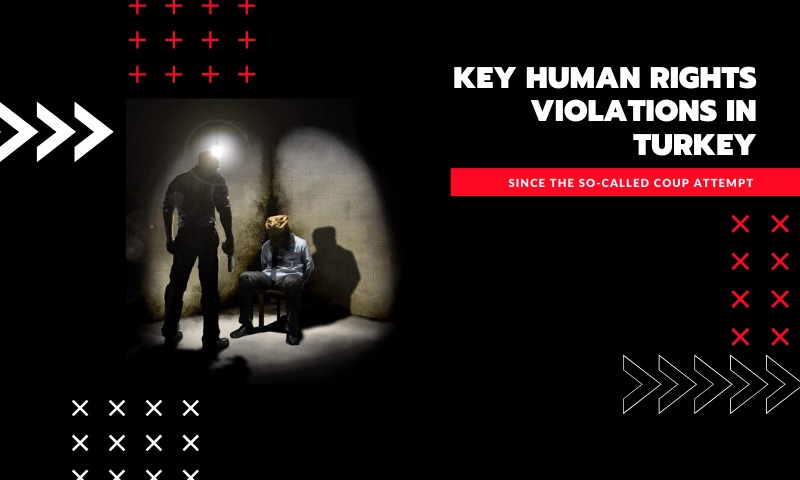Under the political Islamist Erdoğan regime, which has been ruling Turkey since 2002, the number of prisons reached the highest level in history. With Erdoğan’s ruling Justice and Development Party (AKP) abandoning libertarian discourse and policies and turning to one-man rule in the country, it is striking that prison populations have also increased. The prisons were filled with political prisoners far exceeding their current capacity especially after the failed coup attempt in 2015, with the crackdown carried out against the members of the Gülen movement, an international, voluntary-based education and dialogue community, which the Turkish government designated as a terror organization after the corruption allegations in 2013.
Sick and Elderly Political Prisoners IN ERDOGAN’S TURKEY – Special Report
Introduction
The jails in Turkey have long been mentioned in the same breath as inhumane actions and the breach of even the most basic rights, especially against the political prisoners. The violations have reached to unprecedented levels in parallel with the emergence of the current political-Islamist authoritarianism. The oppressive regime under President Recep Tayyip Erdoğan’s rule instrumentalized the country’s legal system to muzzle the political dissidence, turning the prisons into concentration camps. The number of inmates behind the bars has reached historic highs. Hosting convicts much more than their capacities, the prisons, which were already substantially subpar, have fallen way below the minimum acceptable standards for human dignity. Patients in particular bore the most of the brunt of this precipitated deterioration of the prison conditions and the wrath of the Turkish regime against its opponents.
Take Action: Petition the Turkish Authorities to launch a full investigation into the death of MUSTAFA KABAKÇIOĞLU under suspicious conditions in prison
Urging Authorities To Take All Necessary Steps For The Protection of Innocent People in Prisons of Turkey
As it is known the Turkish government has been taking strict measures to silence dissidents from various ideologies recently. Gulen Movement has been the main target of the government, which is a faith-based group of people engaging in different voluntary activities such as education, business, and health. Alleged supporters of the Movement in Turkey have been dealing with arrest, imprisonment, torture, inhuman and degrading treatment, and blocking them to reach their treatments for the health issues.
The last example of these human tragedies in Turkey was the suspicious death of police officer Mustafa Kabakçıoğlu in the Turkish prison.
Mustafa Kabakçıoğlu, a police officer expelled from his job by a statutory decree, died in solitary confinement cell in Gümüşhane Prison on August 29. The guards allegedly found him sitting alone on a chair with his head dropped to the back when they opened the cell door at 5.45 AM.
Mustafa Kabakçıoğlu was put in a confinement cell because he started coughing 9 days ago. Official announcements claim that he suffered from Covid-19 and the reason for his death was virus related. However, he tested negative on the day he died. Besides, his letter to the prison infirmary written 2 days ago from his death indicates that he was clearly suffering from symptoms that are not common for Covid-19.
Erdogan government released more than 90 thousand convicts and prisoners but deliberately kept politically persecuted victims in prisons. Mustafa Kabakçıoğlu was one of these political prisoners as an honorable police officer who was arrested four years ago without any concrete evidence of a crime.
Kabakçıoğlu was suffering from diabetes, asthma, and high blood pressure. Over the course of four years of imprisonment, he complained many times because of insufficient health conditions. Thus, his death happens to be a suspicious case under these circumstances.
In the photographs taken after his death, Kabakçıoğlu is seen sitting on a chair his head down and his nails bruised. His black shirt is dusty. The prison doctor reports him to have died between 2 AM and 3 AM, yet no one knows how it happened.
Kabakçıoğlu filed petitions many times and demanded to go to the hospital regarding his asthma, and diabetic issues that he got in prison since 2017. He fell in the cell twice and lost consciousness. Kabakçıoğlu’s autopsy report on the cause of death is expected to be released within two months. His family filed a criminal complaint with the prosecutor’s office and demanding the people who are responsible for his death to be brought to justice.
Advocates of Silenced Turkey (AST) in its efforts to defend human rights call the Turkish authorities to investigate the case urgently, bring responsible prison personnel to justice, and sanction them adequately. AST also condemns all inhuman treatment and unjust imprisonments in the strongest terms and ask for justice for those under relentless oppression for years.
We call every one of you to raise your voice for the death of Mustafa Kabakçıoğlu for preventing the new cases happen in Turkey.
1- You can send email to the Ministry of Justice of Turkey to urge investigation
[email protected]
2- You can use your social media accounts with this mention list
@adalet_bakanlik
@UNHumanRights
@StateDept
@HelsinkiComm
3- You can send a letter and email to international organizations written below.
***Center to Prevent Torture ( EU)(CPT)
Secretariat of the CPT
Council of Europe
F-67075 Strasbourg Cedex
France
Tel.: France: 03 88 41 39 39, Int.: +33 3 88 41 39 39
Fax: France: 03 88 41 27 72, Int.: +33 3 88 41 27 72
E-mail: [email protected]
Internet: www.cpt.coe.int
***ECCHR
European Center for Constitutional and Human Rights e.V.
Zossener Straße 55–58
Aufgang D
D-10961 Berlin
T: +49 (0)30 – 400 485 90
F: +49 (0)30 – 400 485 92
[email protected]
***Office of the High Commissioner for Human Rights
[email protected]
***Office of the United Nations High Commissioner for Human Rights
[email protected]
[email protected]
You can also use these MEDIA LINKS below in your actions.
1- EU TURKEY RAPORTEUR NACHO SANCHEZ AMOR
#Turkish Parliament passed in April a law to release thousands of inmates from overcrowded prisons in view of #COVID19 but unfairly excluded hundreds who are jailed during the purgue. The case of Mustafa #Kabakçıoğlu is example of the harsh conditions faced by too many in prisons
#Turkish Parliament passed in April a law to release thousands of inmates from overcrowded prisons in view of #COVID19 but unfairly excluded hundreds who are jailed during the purgue. The case of Mustafa #Kabakçıoğlu is example of the harsh conditions faced by too many in prisons
— Nacho Sánchez Amor (@NachoSAmor) October 16, 2020
2- IS MUSTAFA KABAKCIOGLU TORTURED TO DEATH?
3- DEATH OF MUSTAFA KABAKCIOGLU
http://www.politurco.com/public-outcry-for-police-officers-death-in-erdogans-execution-chamber.html
Public outcry for police officer’s death in Erdogan’s “execution chamber”
4- Can Dundar
https://twitter.com/candundaradasi/status/1317405015049441280?s=09
Çıplak, izbe bir zindan,
sıvası dökülmüş, rutubetli duvarlar,
merdiven altında bir yer döşeği, bir plastik masa
ve bir plastik sandalye üzerinde, başı geriye düşmüş halde can vermiş bir tutsak…
Tecritin ölüm demek olduğunun ispatı..
Zulmün fotoğrafı…https://t.co/D2rKn1NpAy pic.twitter.com/gYxt6oDLn0— Can Dündar (@candundaradasi) October 17, 2020
Donate Now
Widget not in any sidebars
Joint Letter by the Human Rights Advocates on the Release of Political Prisoners in Turkey’s Jails
PROMINENT GROUP OF 205 SIGNATORIES CONSISTING OF ACADEMICS, JURISTS, JOURNALISTS, POLITICIANS, HUMAN RIGHTS ACTIVISTS CALL ON TURKEY TO URGENTLY RELEASE POLITICAL PRISONERS IN THE MIDST OF PANDEMIC.
The notoriously overcrowded prisons in Turkey pose serious health threats to inmates during the coronavirus pandemic. The justice reform law passed by the Turkish Parliament that permanently released thousands of prisoners excluded inmates serving time for political crimes, so-called “terrorism.” As many prominent human rights organizations, including Human Rights Watch, acknowledged, those inmates are being held in pretrial detention or sentenced without evidence that they committed violent acts, incited violence, or provided logistical help to outlawed armed groups and their lives are at risk. As indicated in the complaints by the written and oral statements of their families, the inmates’ rights to life – which is among the most basic and universal human rights and is protected by the 10th amendment of the Constitution of the Republic of Turkey and the article 14 of the European Convention on Human Rights (ECHR) – are under clear, serious, and near threat. We are deeply concerned about the escalation of health issues of aforesaid prisoners since cancer and other severe illnesses have increased in Turkish jails. The undersigned jurists, academics, human rights activists, journalists, and politicians, who are concerned with human rights issues, call on the Turkish authorities to urgently release the political prisoners and the prisoners of conscience in Turkish jails before the risk of mass death hits.
SIGNATORIES FROM JURISTS, ACADEMICS, POLITICIANS, HUMAN RIGHTS ACTIVISTS, AND JOURNALISTS
1- Mike O’neal, Attorney, O’neal Consulting, Kansas
2- Dr. James C. Juhnke, Bethel College, North Newton, Kansas
3- Rimsie McConiga, Journalist, Kansas 4- Laurie Dipadova-stocks, Park University
5- Tom Nanney, Visiting Associate Professor University of Missouri/Kansas City School of Law
6- Marcella Sirhandi, Emeritus Professor, Oklahoma State University
7- Doris Chang, Professor of History
8- Prof. Eve Levin, University of Kansas
9- Jude Huntz, Professor of Philosophy, Devry University,
10- Mary Gibson McCoy, Attorney, Missouri
11- Delores Chambers, Professor, Kansas State University,
12- Edgar Chambers, Professor, Kansas State University,
13- Deb Woodard, UMKC Associate Teaching Professor Emerita, Missouri
14- Sofia Khan, MD, Human right activist, founder of K.C. for Refugees, Kansas
15- Gulnar Eziz, Harvard University, MA
16- Stephanie Sabato, Professor Emerita, JCCC, Kansas
17- Judy Ancel, UMKC professor Emerita, Missouri
18- Vince Wetta, State Representative, Kansas
19- Arbana Xharra, Journalist, NY
20- Shruti Mukherjee, Scholar, Stony Brook Univ, NY
21- Steve Sunderland, Ph.D., Director of Cancer Justice Network
22- Gretchen Eick, Ph.D., Professor of History, Emerita, Friends University, Wichita, Kansas Visiting Professor, University of Dzemal Bijedic, Mostar, Bosnia, and Herzegovina
23- Kai Breaux, Scholar, Stony Brook Univ, NY
24- Michael Rubin, Resident Scholar / AEI, USA
25- Lucinda White, Attorney, Kansas
26- Valerie Moyer, Scholar, Stony Brook Univ, NY
27- Carlos Mondlane, Judge, Mozambique
28 – Former Canadian Senator Nancy Ruth.
29- Ruth Schowalter, Lecturer / Georgia Tech Language Institute, GA
30- Caryn Mirriam-Goldberg, Professor, Writer, Kansas Poet Laureate, Kansas
31- Scott Thumma, Professor of Sociology of Religion Director, D.Min. Program Director, Hartford Institute for Religion Research, CT
32- Kari O’rourke, Human Rights Activist, Missouri
33- Wendi Lynn See, Attorney, South Carolina
34- Hakan Acar, LLB, LLM, CPLLM, Ph.D. Barrister and Solicitor Law Society of Ontario, Canada
35- Beth Murano, Attorney, Missouri
36- Curtis Smith, Professor Emerita, Kansas City Kansas Community College, Kansas
37- Sheila Sonnenschein, Human Rights Activist, Community Volunteer, Kansas,
38- Rev. Jennifer Bryan, Human Rights Activist, Kansas
39- Martin Okpareke, Community Outreach and Refugee Family Strengthening Program Manager, Jewish Vocational Services, Missouri
40- Sister Celia Deutsch, Human Rights Activist and Interfaith Coordinator of Our Lady of Refuge Church, New York
41- Sally Hipscher, Human Rights Activist and Chair of Interfaith Coalition of Brooklyn, New York
42- Rabbi Heidi Hoover, Rabbi, Beth Shalom v’Emeth, Brooklyn- NY
43- Margaret Rausch, Ph.D., Independent Scholar, and Freelance Editor and Translator, Kansas
44- Kelly Hansen, Chaplain, Human Rights activist, Missouri
45- Delores Jankovich, Social Worker, Human Rights activist, Missouri
46- The Honorable Judy Sgro, Member of Parliament, Canada
47- Anca Dumitrescu Jelea, Lawyer, JAD Law, CANADA
48- Syndey Carlin, State Representative, Kansas,
49- Lebert Shultz, Attorney at Law, Sheridan at Overland Park, Kansas
50- Dennis Hill, Teacher, Human Rights Activist, Missouri
51- Sophia Pandya, Professor of Religious Studies, Department Chair, California State University at Long Beach, California
52- Kathleen Kirby, Human right activist, and Teacher New Hampshire
53- Josh Hoops, Associate Professor at William Jewell College, Missouri
54- Ed Chasteen, Professor, President HateBusters, Missouri
55- Zoey Shu-Yi Chu, Scholar, Stony Brook University, NY
56- Calvin Hayden, Johnson County Sheriff – Johnson County, KS
57- Shannon S Shaw, lecturer, Texas State University, TX
58- Nance Davies, Artist, Scholar at Massachusetts College of Art and Design
59- Anne Conger, Human Rights Activist, a student in Union Theological Seminary, NY
60- Ramou Colley, Executive Director, the Rahma Project, Sussex, ENGLAND
61- Marina Colorado, News Journalist, France 24 Espanol, Colombia
62- Mario Goico, Retired State Representative, Kansas
63- Sherry Dean Rovelo, Ph.D. Professor, Speech Communication Richland College, Dallas, TX
64- Dr. Ruben L.F. Habito/Professor of World Religions and Spirituality / Director of Spiritual Formation / SMU (South Methodist University) / Texas
65- Rosanne Marie Oates, Human Rights Activist, New York University, NY
66- Elena Chung, Human Rights Activist, New York University, NY
67- Cecilia McLaren, Human Rights Activist, New York University, NY
68- Yasmine Garay, Human Rights Activist, New York University, NY
69- Jodie Adams Kirshner, Research Professor, New York University, NY
70- Corliss Jacobs, Human Rights Activist, Vice President of Board, Cross Border Network for Justice and Solidarity, Kansas
71- Melissa Stiehler, Human Rights Activist, Vice President of Board, Cross Border Network for Justice and Solidarity, Kansas
72- Peggy Neal, Melissa Stiehler, Human Rights Activist, Board Member, Cross Border Network for Justice and Solidarity, Kansas
73- Clara Irazabal, Professor, Director, University of Missouri – Kansas City, Missouri
74- Marc Garcelon, Associate Professor of Sociology, University of Missouri – Kansas City, Missouri
75- Joseph D Jacobs, Human Rights Activist, Missouri
76- G. Dale Mathey, Human Rights Activist, Board Member, Cross Border Network for Justice and Solidarity, Kansas
77- Maeve Cummings, Professor, Pittsburg State University, Kansas
78- Lynne Vanahill, Director of International Student Support Services, Kansas
79- Theresa Torres, Professor, University of Missouri – Kansas City, Missouri
80- Ronald A. Slepitza, President, Avila University, Missouri
81-Michael Poage, Human rights Activist, Author, Kansas
82- Manuela Gonzalez-Bueno, Professor, University of Kansas, Kansas
83- Gail Finney, State Representative, Kansas
84- Tyler A. Shipley, Ph.D. Professor of Culture, Society, and Commerce, Humber Institute of Technology and Advanced Learning, CANADA
85- Morgan Phillips, City Editor of TulsaPeople Magazine, Oklahoma
86- Dr. Catherine Webster, Dean of Liberal Arts College, University of Central Oklahoma, Oklahoma
87- Patrick Raglow, Executive Director of Catholic Charities of Central Oklahoma, Oklahoma
88- Christopher Wright, Scholar / Montana State University, MONTANA
89- Lauren Petersen, Esq, immigration attorney, CT
90- Parvez Mohsin, Director of Nashville International Center for Empowerment, Nashville TN
91- Dr. Ron Massier, Emeritus Professor, Nashville TN
92- Rev. Ellen Sims, pastor, Mobile, AL
93- Kristen James, Chief Development Officer(Non-profit Leader), 29 Acres, TX
94- Styliani Markaki Attorney, Montreal, Quebec, Canada
95- Amanda Roche, Artist, Human Rights Activist, Nashville TN
96- Ellen Gilbert, Executive Director, Global Education Center, Nashville TN
97- Reverend (Rev.) Debra Loudin-McCann, TX
98- John O’Neil, Associate Superintendent, Catholic Schools in the Archdiocese of Newark
99- Nelda K. Latham, Mathematics Professor, Bergen Community College, NJ
100- Ruth Feigenbaum, Mathematics Professor, Bergen Community College, NJ
101- Valeria Correa, Human Rights Activist, Rutgers University, NJ
102- Asma Bawla, Human Rights Activist, New York University, NY
103- Edward E. Goode, Human Rights Activist, Missouri
104- Caroline Davies, Associate Professor, University of Missouri – Kansas City, Missouri
105- Stu Shafer, Professor, Johnson County Community College, Kansas
106- Akash Patel, Human Rights Activist, Founder of Happy World Foundation Inc., Oklahoma
107- Shona Tritt, Ph.D., Clinical psychologist, Lecturer, University of Toronto Scarborough Campus
108- Lisa Wolfe, Professor, Oklahoma City University, Oklahoma
109- Rev. Dr. Richard Nelson, Scholar, Nashville TN
110- Honorable Phil Ramos Deputy Majority Leader. New York State Assemblyman, Brentwood NY-Honorable
111- Bob Sweney Former New York State Assemblyman, Lindenhurst, NY
112- Honorable Michelle Schimel, Former New York State Assemblywoman, Port Washington, NY
113- Tom Goodhue Executive Director Emeritus, Long Island Council of Churches, New York, NY
114- Rabbi Steven Moss, Chair Emeritus, Suffolk County Human Rights Commission, Oakdale, NY
115- Rev. William F. Brisotti Pastor, Our Lady of the Miraculous Medal Church, Wyandanch NY
116- Reverend JoAnn Barrett, The founder of Gathering of Light Interspiritual Fellowship. Huntington, NY Co-Chair, Suffolk County Anti-Bias Task Force, NY
117- Rev. Dr. Walter H. Wagner, Ph.D. Professor, Pastor and Author, Bethlehem, PA
118- Richard Koubek, Ph.D. Community Outreach Coordinator, Long Island Jobs with Justice, Suffolk County NY
119- Thomas Petriano, Ph.D. Professor of Religious Studies, St Joseph’s College Patchogue NY
120- Latifa Woodhouse and Colin Woodhouse Co-Chairs Shared Humanity of USA, New York
121- Soh Young Lee-Segredo, Former Nassau County Human Rights Commissioner, NY Multicultural Council of NY
122- Edward Andrew, Professor Emeritus, Department of Political Science, University of Toronto, Toronto, Ontario M5s 3G3, Canada. Ed Andrew
123-Catherine Green, Professor, Missouri
124- Peter Milliken, Former Canadian Member of Parliament and the Speaker of Canadian Parliament from 2001 to 2010.
125- David Kilgour, Former Member of Parliament (M.P.) and Secretary of State. Canada
126- Ornela Bego, Lawyer, TX
127- Karman Kurban, Assistant Professor, North American University
128- Lisa DiCarlo, Professor & Human Right activist, Brown University, Rhode Island
129- Aesetou Hydara, Human Rights Activist, New York University
130- Jihad Elgouz, Human Rights Activist, New York University
131- Jenna Elshahawi, Human Rights Activist, Rutgers University
132- Miguel Isidoro, Human Rights Activist, Pace University
133- Benjamin S. Yost, Professor of Philosophy, Adjunct, Cornell University
134- Susan Ashbrook Harvey, Professor of History and Religion, Brown University
135- Johan Heymans, Lawyer, Belgium
136- Rev. Don Cottrill, Human Rights Activist, Louisiana
137- Robert Mann, Professor, Manship Chair, Louisiana
138- Vicki Dauterive, Human Rights Activist, Together Baton Rouge, Louisiana
139-Jane Chandler, Professor, Louisiana
140- Sissy Stephans, Human Rights Activist, Louisiana
141-Dauda Sessay, Human Rights Activist, Louisiana Organization for Refugees and Immigrants, Louisiana
142-Rev. Michael Habert, Human Rights Activist, Louisiana
143-Alcibiades P. Tsolakis, Professor and Dean, College of Art and Design, Louisiana State University, Louisiana
144-Roxanne Stoehr, Professor, Southeastern Louisiana University, Louisiana
145-Sonny Marchbanks, Political Consultant, Mars De Banques, Louisiana
146-Vicki Brooks, Human Rights Activist, Together Baton Rouge, Louisiana
147-Al Gensler, Retired, Urban Development Director, City of Baton Rouge, Louisiana
148-Marilyn Gensler, Human Rights Activist, Louisiana
149-Dawud Sesay, Human Rights Activist, Louisiana
150-Dr. Richard Webb, Professor, and Dean Emeritus, Southern University Baton Rouge, Louisiana
151-Christopher Gerdes, Professor of History, North American University, TX
152- Sherly Sullivan, Attorney, Oklahoma
153- Prof. Amy Remensnyder, Professor of History, Brown University
154- Laura Faria-Tancinco, Human Rights Activist, Rhode Island College
155- Sevdenur Cizginer, Assistant Professor of Medicine, Brown University
156- Mohammad Niamat Elahee Ph.D., Professor, Dept. of International Business, Quinnipiac University, CT
157- Naoko Shibusawa, Associate Professor of History, Brown University, RI
158- Bathsheba Demuth, Assistant Professor of Environment and Society & History, Brown University, RI
159- Lopita Nath, Ph.D., Professor, University of the Incarnate Word, TX
160-Martha Ann Kirk, Ph.D., Professor of Humanities, University of the Incarnate Word, TX
161-Armen Babajanian, Executive Director at World Affairs Council of San Antonio, TX
162-Simran Jeet Singh, Ph.D., Visiting Professor, Union Seminary, NY
163-Larry Hufford, Ph.D., Professor, St. Mary’s University, TX
164-Pastor Paul Ziese, Human Rights Activist, TX
165-John Comer, Professor Emeritus, Chair of Political Science Department, University of Nebraska Lincoln, Nebraska
166-Nancy Comer, Retired Teacher, Lincoln Public Schools, Vice Pres of Friendship Force, Lincoln, NE
167-Professor Thomas Dinapoli, Languages DepartmentLouisiana State University, Louisiana
168- Dr. Ahmet Sanic, Former Vice President Alatoo-International University, United Kingdom
169- Seyit Kaya, Information Communication Technology, Educator, United Kingdom
170- Rev. James C. Harrington, Human Rights Activist, Texas
171 Dr. Ramin Ahmadoghlu, Researcher, Emiry University, Georgia
172- Omer Kuru, Professor, University of Aberdeen, United Kingdom
173- Ali Yurtsever, Human Rights Activist and Executive Director, İslamic Society of Midwest, Illinois
174- Isaac Gold, Executive Director, Huddled Masses, Illinois
175- Mehmet Sayın, Professor, Texas
176- Kamaruddin Mohd Yusoff, Professor, University of Malaya, Kuala Lumpur, Malaysia
177- Robert Adan Williams, Educator, California
178- Mehmet Karadayi, Ph.D., Educator, Colombia
179- Salih, Professor, Georgia
180- Avery Rollins, Retired FBI Agent, Mississippi
181- Catherine Freis, Emerita Professor of Greek and Roman Studies at Millsaps College, Mississippi
182- Richard Freis, Emeritus Professor of Greek and Roman Studies at Millsaps College, Mississippi
183- Jeremy Tobin, Priest and Human Rights Activist, Mississippi
184- Adele Crudden, Professor, Mississippi
185- Robert McElvaine, Professor of History at Millsaps College, Mississippi
186- Joan Mylroie, Retired Faculty at Mississippi State University, Mississippi
187- Steve Smith, Professor of Philosophy and Religious Studies at Millsaps College, Mississippi
188- Rims Barber, Mississippi Human Services Coalition, Mississippi
189- Judy Barber, Mississippi Human Services Coalition, Mississippi
190- James Bowley, Professor and Chair of Religious Studies at Millsaps College, Mississippi
191- Dr. Mark McLain, M.D., Mississippi
192- Sen. Hillman Frazier, Mississippi State Senator, Mississippi
193- Dr. David Breaux, Former Dean, College of Arts and Sciences at Delta State University, Mississippi
194- Ali Dag, Associate Professor, Creighton University, Nebraska,
195- Ferhat Ozturk, Ph.D., Biomedical Science Teacher, Texas
196- Thomas Dinapoli, Professor, Louisiana State University, Louisiana
197- Adv. Ashraf Muhammed, Former Chairman of Western Cape and Member of National Association of Democratic Lawyers(NADEL), Cape Town, South Africa
198- Amina Frense, Council Member of South African National Editors Forum (SANEF) and Chairperson at the Institute for the Advancement of Journalism, Johannesburg, South Africa
199- Kisten Govender, Elected Member of South African Legal Practice Council, Durban, South Africa
200- Ela Gandhi, granddaughter of Mahatma Gandhi, Founder of Gandhi Development Trust, Durban, South Africa
201- Judy Sandison, Founder Member of South African National Editor’s Forum (SANEF), Former Provincial Editor of South African Broadcasting Corporation (SABC), Durban, South Africa
202- Dr. Huseyin DURU, Professor, Texas
203- Dr. Havva Simsek, Professor, United Kingdom
204-Howard Gordon, Presbyterian Minister, Activist, Arkansas
205-Mehmet Halidun, Assistant Professor, Arkansas Tech University, Arkansas
Donate Now
Widget not in any sidebars
KEY HUMAN RIGHTS VIOLATIONS IN TURKEY SINCE THE SO-CALLED COUP ATTEMPT
Following the so-called coup attempt on the 15th of July 2016, the Turkish government under the authoritarian leadership of Recep Tayyip Erdogan has taken a wave of oppressive actions against not only the alleged coup plotters but also those that are perceived as critics of the regime. Currently, as part of Turkey’s post-coup crackdown, more than 130,000 people including judges, academics, teachers, journalists, police and military officers, and other public servants have been dismissed from their jobs. In correlation, more than 217,000 have been detained and 160,000 have been arrested. Amnesty International reports that detainees were “being held arbitrarily” with “no evidence establishing reasonable suspicion of criminal behavior” and that “only a tiny minority of them were accused of taking part in the actual events of the attempted coup”.
Amid the massive crackdown of hundreds of thousands of dissidents, human rights organizations and the U.N. Human Rights Council have noted that human rights are violated on a large scale by the Turkish government. Arbitrary killings, suspicious deaths of people in custody, forced disappearances, tortures, ill-treatments, injustice, and threats – mostly against the followers of the Gulen Movement, Kurds, and the Leftists – have been reported widespread during this large-scale witch-hunt.
As people continue to be arrested and many more tortured and abducted, the present brief of Advocates of Silenced Turkey (AST) highlights some of the key human rights concerns that have taken place in Turkey during this on-going period.
● UNPRECEDENTED SCALE OF DISMISSALS:
More than 130,000 public servants, with their names attached in lists to emergency orders, were dismissed by emergency decrees. These public servants included over 4,463 judges and prosecutors, 6,021 academics, 6,000 health-care professionals, 33,500 teachers, and 44,500 police and military officers. Not only were people dismissed arbitrarily but also banned permanently from working in the public sector – many were even banned to practice their profession.
- COLLAPSE OF JUDICIARY SYSTEM:
With approximately 4,463 judges and prosecutors (including two judges from the Turkey’s highest court) dismissed permanently, over one-fifth of Turkey’s judiciary has been removed. Of those dismissed, at least 2,200 were jailed with their assets frozen due to their alleged links to the Gulen movement. Consequently, the climate of fear paralyzed the judges and prosecutors who still have their positions. The fear combined with the heavy government influence in the court system led to the collapse of the judiciary system and the deterioration of human rights in the country. As a result, Turkey ranked 109 out of 126 countries in 2019 on the rule of law index of the World Justice Project.
- VICTIMIZATION OF LAWYERS:
Lawyers are among the many groups affected by the post-coup crackdown in Turkey. They were unlawfully associated with their clients’ alleged crimes. Human Rights Watch (HRW) reported that many lawyers were targeted with criminal investigations with little or no evidence. According to the Arrested Lawyers Initiative, over 1,500 lawyers were persecuted over the past three years including 14 lawyers who were presidents of provincial bar associations – of those persecuted lawyers, one third remained imprisoned before and during their trials, and 274 were convicted of membership of armed terrorist organizations and sentenced to long prison sentences. Furthermore, approximately 34 bar associations were shut down by presidential decree with alleged affiliations to terrorist organizations.
- PERSECUTION OF ACADEMICS:
Following the coup attempt, 3,003 private schools and 15 universities linked to the Gülen movement were closed by a presidential decree. Eventually resulting in the displacement of over 60,000 students across the country. Over 8,500 academics reportedly lost their jobs either due to direct dismissals or university closures since September 2016 – and many of them were imprisoned. Large-scale dismissals of academics and teachers significantly damaged the education sector thus diminished the right to education.
- BOOKS DESTROYED:
Turkey’s education minister Ziya Selçuk announced last week that 301,878 books had been destroyed as the government cracks down on anything linked to Fethullah Gülen. Turkish newspaper BirGün reported that 1.8m textbooks had been destroyed and reprinted for containing the “objectionable” word Pennsylvania, which is where Gülen lives.
- THE MEDIA PURGE FOLLOWING THE ATTEMPTED COUP:
In the aftermath of the failed coup, the government closed down 200 media outlets – including 53 newspapers, 37 radio stations, 34 TV channels, 29 publishing houses, 20 magazines, and six news agencies – with accused links to the Gulen movement, Kurdish opposition, or Leftists groups. Consequently, a total of 2,308 media workers and journalists have lost their jobs. The government canceled hundreds of press accreditations and revoked passports of an unknown number of journalists and their family members to ban them from traveling abroad. In addition, the government imprisoned a record-breaking number of journalists in the wake of the coup attempt – with that, Turkey became the world’s largest prison for journalists. The Platform for Independent Journalism (P24) reported that at least 126 journalists and media workers were in prison in Turkey as of October 2019 – among them, many were put in long solitary confinement.
The absence of freedom of expression is not only a recurring problem for journalists but for citizens as well. In 2018, the Ministry of Interior reported that more than 7,000 individuals were detained for their social media posts after investigating 631,233 digital materials. In relation to the censorships and content restrictions in the country, Wikipedia has been blocked in Turkey since April of 2017. Currently, out of the 180 countries, Turkey ranks 157th on the Press Freedom Index of Reporters Without Borders and is listed among ‘not free’ countries by the Freedom House.
- CRACKDOWN ON HEALTH CARE SECTOR:
Turkish government has shut down 14 hospitals and 36 medical centers after the coup attempt on the pretext of alleged ties to the Gülen movement. Therefore, an estimated 21,000 health care professionals were laid off – including doctors, academics, nurses, midwives, and other hospital staff. Of those, 5,261 are medical doctors and academics who specialize in the medical sciences. The figures of how many health care professionals have been detained, arrested or currently in prison are estimated in the thousands. Given the longstanding issue of hospital and staff shortages in the country, the dismissals of health care professionals and the closure of hospitals left many patients in despair of medical care.
- PRISON CONDITIONS:
With the persecution of tens of thousands of critics, the current population in Turkish prisons is 4-5 times higher than the normal capacity – it has increased from 171,267 inmates in 2015 to 260,144 in 2018. Given the capacity of 211,766, inmates are forced to remain in overcrowded cells. In order to free up space for more political prisoners, the government released nearly 34,000 convicts from prisons. The inadequate provision of health care to prisoners also remains a serious problem. Officially reported by the Ministry of Justice Prison and Correctional Facilities, there were 271 doctors serving nearly a quarter-million of the prison population – of whom, only eight were full-time. Insufficient access to freshwater, proper heating, ventilation, and lighting are other concerns for prison conditions. There are 62,669 political prisoners, 4,000 of them being women and 780 of them being children.
- TORTURE AND ILL-TREATMENT:
Despite the government’s zero-tolerance claim for torture policy, human rights groups have reported widespread and systematic use of torture and ill-treatment in police custody following the coup-attempt – including severe beatings, threats of sexual assault and actual sexual assault, electric shocks, waterboarding, sleep deprivation, stress positions, long solitary confinement, and depriving of food and water. The Office of the United Nations High Commissioner for Human Rights (OHCHR) stated acts of torture and ill-treatment aimed “at extracting confessions or forcing detainees to denounce other Individuals” in its report on Turkey in 2017. The Human Rights Association (HRA) reported that the number of incidents where prisoners were subjected to torture and ill-treatment in detention centers and prisons was 2,178 in 2016, 2,415 in 2017, and 1,505 in 2018. The Stockholm Center for Freedom (SCF) reported a total of 126 suspicious deaths and suicides since the coup attempt – most of those occurred in detention centers and prisons, seemingly a direct result of torture and ill-treatment.
- ABDUCTIONS AND ENFORCED DISAPPEARANCES:
In the aftermath of the coup attempt, forced disappearances made a comeback in Turkey. Opposing politicians and respected human rights groups claimed at least 128 abductions or possible enforced disappearances of individuals. Most of the victims were identified as dismissed public servants with alleged ties to the Gulen movement or critics of the government. Allegedly, victims were abducted outside detention facilities and illegally questioned and tortured by Turkey’s intelligence agency. Moreover, Turkey’s intelligence agency reportedly abducted over more than 100 alleged Gulen affiliates from 18 countries – individuals often deported illegally – against the universal conventions – by cooperative governments without due process.
- WOMEN AND CHILDREN IN PRISON:
The prison conditions for women and children are exceedingly alarming. According to the Justice Ministry, as of 2017, nearly 10,000 women and 3,000 children under 18 are in Turkey’s prisons. The inhumane prison conditions also hold weight in women prisons. They face additional issues of the male security staff frequently obstructing their privacy during hospital visits, oftentimes leading to an incomplete examination. Among the prisoners, there are more than 30 pregnant women or women who just gave birth and 780 children under 6 years old imprisoned along with their mothers – including 149 infants under 1-year-old. Pregnant women are forced to stay with other inmates in overcrowded cells, also denied access to proper prenatal care – posing serious risks to their well-being. Likewise, mothers with children are also forced to share a cell with inmates.
Even when prison authorities are willing to let the child see a doctor, they do not allow mothers to accompany them. Children have to sleep in the same bed with their mothers and are not assigned a cradle or a separate bed.
The state pays $2 a day per prisoner for food. Since children are not technically incarcerated, they are not allotted any daily food rations and share their mother’s meals.
More than %80 of children in jail with their mothers do not receive any education.
Only %18 receive kindergarten or nursery services, but even then, there is a shortage of educational materials.
- RESTRICTIONS ON RIGHT TO TRAVEL:
Another unlawful activity being pursued during this period is revoking the passports of government critics with perceived affiliations to the Gulen movement, Kurdish opposition, Leftists groups and their family members. On this ground, the Turkish government put restrictions on approximately 155,000 passports, reported by the SCF. Since their passports are restricted, many people, with the fear of persecution, use smuggler routes to flee from the country. Unfortunately, many died in the Evros River and the Aegean Sea. Turkey revoking its citizens’ passports also causes travel struggles for those across the world.
- SEIZURE OF DISSIDENTS’ ASSETS:
The Turkish government abuses laws to seize assets of its critics. As of March 2018, the government had seized the assets of approximately 1,124 businesses and 127 individuals. According to the Savings Deposit Insurance Fund of Turkey, the net worth of the seized assets is an estimated $32.24 billion since the 2016 coup attempt. Moreover, in most cases, the government freezes the assets of those on trial, financially crippling them and their families.
SOURCES
- https://www.amnesty.org/en/latest/news/2016/07/turkey-independent-monitors-must-be-allowed-to-access-detainees-amid-torture-allegations/ https://www.amnesty.org/en/countries/europe-and-central-asia/turkey/report-turkey/
- https://www.state.gov/reports/2018-country-reports-on-human-rights-practices/turkey/
https://www.ohchr.org/Documents/Countries/TR/2018-03-19_Second_OHCHR_Turkey_Report.pdf
- https://turkeypurge.com/turkey-jails-2431-judges-prosecutors-dismisses-4424-to-date-top-court
- https://worldjusticeproject.org/sites/default/files/documents/ROLI-2019-Reduced.pdf
- https://oldwebsite09012025.silencedturkey.org/lawyers-on-trial-abusive-prosecutions-and-erosion-of-fair-trial-rights-in-turkey-2
https://arrestedlawyers.org/2019/09/01/new-report-mass-prosecution-of-lawyers-in-turkey/
- http://silencedturkey.org/wp-content/uploads/2018/05/AcademicsAtRisk.pdf
- https://www.theguardian.com/books/2019/aug/06/turkish-government-destroys-more-than-300000-books
- https://www.theguardian.com/world/2016/sep/11/brothers-critical-turkish-regime-arrested-after-tv-programme
https://tr.euronews.com/2019/07/12/verilerle-15-temmuz-sonras-ve-ohal-sureci
- https://expressioninterrupted.com/freedom-of-expression-and-the-press-in-turkey-211/
- https://www.state.gov/reports/2018-country-reports-on-human-rights-practices/turkey/
- http://www.tuik.gov.tr/PreHaberBultenleri.do?id=27610
- https://www.state.gov/reports/2018-country-reports-on-human-rights-practices/turkey/
- https://www.ihd.org.tr/sample-page-2/
- 2016 https://www.ihd.org.tr/2016-yili-turkiye-insan-haklari-ihlalleri-bilancosu/
- 2017 https://www.ihd.org.tr/2017-turkiye-insan-haklari-ihalleri-bilancosu/
- 2018 https://www.insanhaklaridernegi.info/wp-content/uploads/2019/04/2018IHDYillikRapor_Bilanco.pdf
- https://stockholmcf.org/suspicious-deaths-and-suicides-in-turkey-updated-list/
- https://correctiv.org/en/top-stories-en/2018/12/06/black-sites/
- http://www.tuik.gov.tr/PreHaberBultenleri.do?id=27610
https://7dnews.com/news/inmates-facing-poor-living-conditions-and-death-in-turkish-prisons
- https://stockholmcf.org/turkeys-dismissed-academics-want-their-passports-back-after-state-of-emergency-lifted/
- https://twitter.com/platformpj/status/1234421262052732928/photo/1
http://www.platformpj.org/report-the-erosion-of-property-rights-in-turkey/
Donate Now
Widget not in any sidebars

